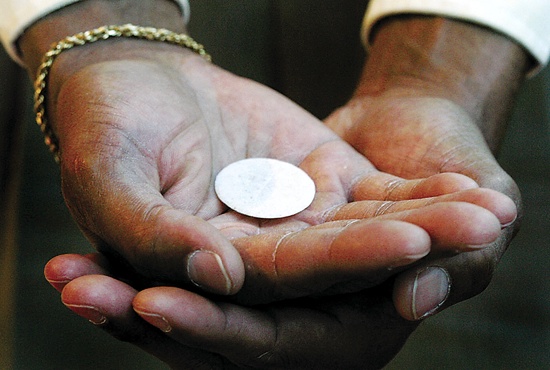A sermon preached at Guildford Cathedral on the feast of Corpus Christi: Genesis 14:18-20; 1 Corinthians 11:23-26; John 6 51-58. The refrain ‘Come, eat my bread’ is a translation of Homo quidam by Thomas Tallis. Preaching on the Eucharist in the light of bread - what we waste, buy, lack and give - is particularly poignant in the light of the catastrophic fire at Grenfell Tower.
Come, eat my bread - because everything is ready!
Garlic bread, ciabatta, sourdough, rye: taken, broken and shared over dinner, perhaps with a word of grace.
Bread is the epitome of ordinary. But, from the days of Melchizedek, when combined with a glass of wine, bread is an expression of blessing, celebration, conviviality, peace and fellowship.
Yet, in the face of this abundance, 32% of bread purchased in the UK is thrown away. That’s 4.4 million tonnes of edible food wasted as1000s queue at food banks.
Bread is the stuff of painful paradoxes: we buy too much because we fear running out; but a cheap commodity is easily discarded. The factory “white-sliced” competes with the artisan or homemade loaf for time, cost, energy, skill and taste.
Is it that we’ve lost touch with the process of making bread?
Have we lost respect for this ordinary, life-sustaining food?
Do we squander this gift of creation and work of human hands?
Everything is ready. Come, eat my bread.
The bread we break tonight - this fusion of flour, kneading, resting and baking - is a sacred mystery. We take ordinary bread so seriously, that through the power of the Spirit it becomes more than. More than material stuff - a gift of grace, of Christ’s presence with us - and in us.
Yes, this bread is blessed, broken and shared by human hands; Yes, this bread is placed into human hands to be touched, taken and eaten. And yet, in this wonderful sacrament the King of kings has given himself to us for heavenly food.
On Maundy Thursday, we entered into the solemnity of betrayal, denial and death; tonight we enter with thanksgiving into the deep joy of Christ’s nearness to us and his promise to be with us for evermore.
Every Eucharist is a repetition - but it’s never the same. Paul wrote to the Corinthians reminding them of what he had received and passed on to them: that Jesus took the blessing and breaking of bread, and imbued it with a new reality.
Even before those words were written down, Christians - followers of the way - had broken bread together. It’s not only a command ‘do this’ - it is relationship ‘this is my body, my blood’. It’s more than memorial, it’s proclamation. It’s not just what we hear, it’s who we are: ‘The body of Christ’.
Come, eat my bread and drink the wine I have mixed for you.
‘Was ever another command do obeyed?’, wrote the liturgist Gregory Dix.
Today, in prisons, parishes, homes, hospitals, universities and refugee camps; at weddings and confirmations, at a death bed in hours of darkness and as rays of light breakthrough our Lady Chapel window.
Over centuries in trenches, monasteries, slums, portacabins and palaces; in the face of persecution and influence, on the edges of the known world. And Sunday by Sunday by unremarkable Sunday from Melbourne to Cairo, Beijing to Oslo, Guildford to Mexico City.
Come, eat my bread.
This pattern of ‘non-identical repetition’ is like the continuity and difference in a Bach fugue or Jazz improvisation. The liturgical repetition ‘do this’ is just the beginning. This great feast of Corpus Christi directs our attention to Christ with us so that we might be sent out to be his body.
Our communion with God and one another is renewed in this wonderful sacrament. Heaven and earth touch; divisions cease; we glimpse the peace of God’s Kingdom. For a moment our alleluias resound with saints and angels.
This night we extend the moment of communion - my seconds, by minutes - to ponder with reverence, praise and wonder ‘for with blessing in his hand, Christ our God to earth descended, our full homage to demand’. But what we see, what we honour, is who we are. The Body of Christ.
As we process with beauty and honour, with music and song, with rose petals and footsteps, we remember that Christ is with us - reigning over heaven and earth. That is our ultimate reality. We reverence Christ’s nearness in ordinary bread, on steps looking out over the community. There we are challenged and inspired to walk in his steps, on this earth, as a pilgrim people.
Yes, the profound mystery and wondrous reality is that ‘Word-made-flesh, true bread he taketh by his word his flesh to be’. But the equally profound and wondrous reality is that we have been grafted into Christ. By the power of his Spirit we are to both know within us and also show forth in our lives, the fruits of redemption.
What that looks like has been demonstrated by St Clement's Church - and others - which have opened their doors in response to the fire at Grenfell Tower. To those who have no bread, they said ‘come’. ‘Come’ find refuge, breakfast, consolation; ‘come’ bring toiletries, clothes and food; ‘come’ pray, rest and know that you are not alone - in the immediate catastrophe and in the long term.
In the power of the Spirit, may we too show forth God’d healing and reconciling love; may we too be with others as Christ is with us: in the mundane and in the crisis; in celebration and sorrow; in abundance and in need.
Jesus said, ‘I am the living bread’. The bread that he gave for the life of the world was his flesh.
Come, eat that bread.
Everything is ready.
Come.
© Julie Gittoes 2017



